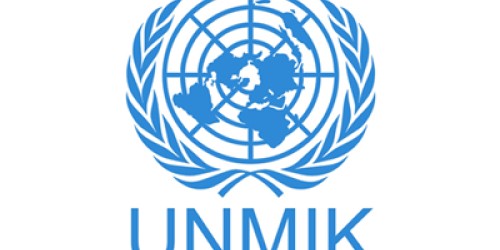The mandate of the United Nations Interim Administration Mission in Kosovo (UNMIK) was established by the Security Council in its resolution 1244 (1999).
In accordance with its strategic framework, the Mission helps to ensure conditions for a peaceful and normal life for all inhabitants of Kosovo and advance regional stability in the Western Balkans.
The Special Representative ensures a coordinated approach by the international civil presence operating under Security Council resolution 1244 (1999), including the Organization for Security and Cooperation in Europe (OSCE), which retains the status of UNMIK's pillar for institution building.
The Special Representative also ensures coordination with the head of the European Union Rule of Law Mission in Kosovo (EULEX), which has operational responsibility in the area of rule of law. EULEX is deployed under Security Council resolution 1244 (1999), and operates under the overall authority of the United Nations.
The Mission has its headquarters in Pristina and is supported by field offices in Mitrovicë/Mitrovica and Pejë/Peć.
In addition, the UN Office in Belgrade plays an important political and diplomatic role and liaises with political leadership of Serbia.
Kosovo declared independence on the 17 February 2008 and it has been recognized by more than 100 UN Member States. UNMIK continues to implement its mandate in a status neutral manner and operate under Security Council resolution 1244 (1999).
UN Peacekeeping Fact Sheet for UNMIK
Adopted by the Security Council at its 4011th meeting, on 10 June 1999
[S/RES/1244(1999)]
Approved posts (as per 1 July 2021)
374 total including:
- Civilian personnel:
- 112 international staff
- 220 national staff
- 24 UN Volunteers
- 18 total uniformed personnel
- 8 military observers
- 10 United Nations police officers
Financial aspects
Method of financing: Assessment in respect of a Special Account
Budget for UNMIK for the period from 1 July 2021 to 30 June 2022 - SG Report (07/2021 – 06/2022): $41,298,500 [A/75/779]
UN Presence in Kosovo
The UN system in Kosovo is comprised of the United Nations Interim Administration Mission in Kosovo (UNMIK) led by the Special Representative of the Secretary General (SRSG), and the UN agencies, funds, programmes and affiliates, which are grouped under the coordinated umbrella of the United Nations Kosovo Team (UNKT), and are led by a UN Development Coordinator.
The UN presence is comprised of the following UN agencies and partners:
UNMIK Activities
The priorities of the Mission remain to promote security, stability and respect for human rights in Kosovo and in the region. In furtherance of its goals, UNMIK continues its constructive engagement with Pristina and Belgrade, the communities in Kosovo and regional and international actors.
Owing to the strong leadership and commitment of Belgrade and Pristina, which culminated in the landmark 19 April 2013 First Agreement of Principles Governing the Normalization of Relations, 2013 was a year of significant political progress. Together with the fundamental progress made in the European Union-facilitated dialogue, both parties have also achieved substantial progress in their objective to foster a closer association with the European Union institutions. The successful holding of Kosovo local elections, including in the northern Kosovo municipalities, for the first time under a single legislative framework, has opened space for new political dynamics within Kosovo, as well as the beginning of a new phase of engagement between the parties towards full implementation of the 19 April agreement. The ongoing direct discussions between Pristina and Belgrade were instrumental to that success and will remain important for ensuring that the progress achieved withstands challenges arising from differences of interpretation or tensions on the ground.
Looking ahead, UNMIK will continue to enhance its support of the implementation of the agreements reached between Belgrade and Pristina. Strengthening formal and informal channels of communication among authorities at all levels and between all communities in Kosovo is a critical objective for the coming period. The resources of UNMIK, as well as of international partners on the ground, will continue to be fully applied toward supporting and facilitating such efforts.

